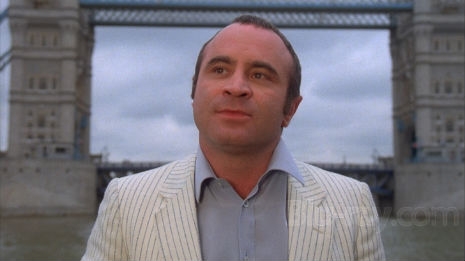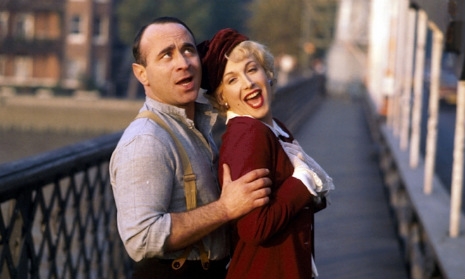
The actor Bob Hoskins, best known for his roles in The Long Good Friday, Mona Lisa, Who Framed Roger Rabbit, Mermaids and Twenty Four Seven has died from pneumonia at the age of 71.
Hoskins died in hospital surrounded by his family. In a statement, his wife Linda and children Alex, Sarah, Rosa and Jack said:
“We are devastated by the loss of our beloved Bob.
“We ask that you respect our privacy during this time and thank you for your messages of love and support.”
There was a humanity and warmth about Hoskins that made him incredibly likable—something that can be seen by the current outpouring of condolences on Twitter. I was fortunate to meet Hoskins briefly once, at the premier of his first major movie The Long Good Friday. Having grown-up watching him on TV in the sit-com Thick As Thieves, the educational series On the Move (which was a reading program for adult literacy, but was a must watch because of Hoskins’ removal man), and Dennis Potter’s Pennies for Heaven, where he was unforgettable as a music sheet salesman, Arthur Parker, playing opposite Cheryl Campbell.
Then came The Long Good Friday where he played one of cinema’s greatest gangsters, Harold Shand, an ambitious and brutal villain who falls foul of the IRA. It was the Irish issue that led some fools to boo the film at its premiere in Edinburgh. As I was leaving the cinema, I found myself beside Hoskins and director John MacKenzie as we walked down the stairs and out onto the foyer. He turned and started talking to me as if we were mates who had gone to the cinema to watch the film. He asked me whether I thought the film was pro-IRA? I said “no” and then we talked a bit about the movie and Edinburgh. I was more keen to tell him how great the film and superb his performance, and he was humble and gracious, but deflected the praise by asking where he could find a good pub?
Back then there were fewer TV channels and hardly any inane reality shows clogging up all the air-time. This meant the bar was far higher and the quality of shows undeniably better. That’s how the country was able to see Hoskins as Iago in Jonathan Miller’s BBC production of Othello. It confirmed that Hoskins as an actor could do anything and successfully, which is what he went on to do over the next three decades.
Bob Hoskins was born on 26th October 1942. His father was a Communist, who brought Hoskins up as an atheist. He later said it was his mother who gave him “confidence”:
“My mum used to say to me, ‘If somebody doesn’t like you, fuck ‘em, they’ve got bad taste.’”
Hoskins left school at fifteen and undertook a variety of jobs (including time at a kibbutz, and working in a circus) before accidentally auditioning and winning his first acting role. Hoskins had been accompanying an actor friend for moral support, when he was asked to audition himself. From this first role, he went on to star in a range of television and stage productions, before achieving success with the series Pennies from Heaven and then The Long Good Friday.
During the 1980s he appeared in The Cotton Club, Neil Jordan’s Mona Lisa, The Lonely Passion of Judith Hearne, and the film that made him an international star Who Framed Roger Rabbit in 1988.
More recently Hoskins showed his support for young talented film-makers by appearing in Shane Meadows’ Twenty Four Seven and A Room For Romeo Brass. Of course, he also made a few stinkers, but then that’s the nature of cinema. But no matter what film he appeared in, Bob Hoskins’ performance was often the best thing about it.
In 2012, Hoskins announced his retirement form acting after being diagnosed with Parkinson’s disease.
R.I.P. Bob Hoskins 1942-2014
Here’s the first part on the making of The Long Good Friday, written by Barrie Keefe, which starred Bob Hoskins.






